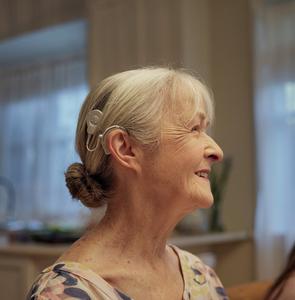Cochlear implants are designed to make sounds clearer²⁻³
Hearing aids work by making sounds louder. However, some people still struggle to hear, even with powerful hearing aids.
Cochlear implants work differently and may help give you that clarity, even in noisy environments²⁻³.
Cochlear implants work differently and may help give you that clarity, even in noisy environments²⁻³.

Make hearing clearer²⁻³, not just louder.
Improve hearing in noise.⁵
Increase hearing satisfaction and improve quality of life.³⁻⁴
Is it time to take the next step?
Do you struggle to
have conversations
on the phone?
have conversations
on the phone?
Do you often ask
people to repeat
themselves?
people to repeat
themselves?
Do you have trouble
hearing conversations
in noisy places?
hearing conversations
in noisy places?
If you answered YES to any of the above, a cochlear implant may be right for you.
Understanding the cochlear implants
Cochlear implants are designed to transmit sounds directly to the hearing nerve, helping to restore clear hearing even in noisy environments 5. If you are not getting the clarity of the sound you need, a cochlear implant may help you hear again.

1.
The sound processor converts sound into electrical signals and transmit those signals to the implant.
2.
The implant carries the electrical signals directly to the hearing nerve.
3.
Electrodes in the implant stimulate the hearing nerve, restoring the experience of sound.
Frequently asked questions
We hope the following contains some of the answers you
need to take the next step. Connect with an expert for
answers to any questions not listed here.
need to take the next step. Connect with an expert for
answers to any questions not listed here.
Cochlear implants use electrical impulses to transmit sound to the inner ear
and on to the hearing nerve. These electrical impulses are then interpreted
by the brain as sound.
Cochlear implant surgery can last up to two hours for one ear. The surgery is typically outpatient and performed under general anesthesia. Most people are back to their normal routine after a couple days of recovery.
State governments fund a limited number of cochlear implants each year. Private health insurers may also be able to provide a full reimbursement for the cochlear implant system, depending on your level of insurance. For those eligible, the Department of Veterans’ Affairs (DVA) provides devices included on the Prostheses List and will cover 100% of costs associated with cochlear implants.
Cochlear implants work differently than hearing aids. For some, hearing aids may be an effective option to treat hearing loss. Research shows that 93% of cochlear implant recipients demonstrated significantly improved speech understanding compared to a hearing aid.6 A study of 94 patients also found that adults over 65 with severe to profound hearing loss could think, learn, and remember better when treated with a cochlear implant.7
One of the first steps to getting a cochlear implant is to get tested by an audiologist who is trained in cochlear implants and advanced hearing technologies to see if you qualify as a candidate.
Living life with the Cochlear
Disclaimer
Please seek advice from
your health professional about treatments for hearing loss. Outcomes may vary, and your health professional
will advise you about the factors which could affect your outcome. Cochlear implants are for the treatment
of moderately severe to profound hearing loss. Always follow the instructions for use. Not all products are
available in all countries. For Cochlear TM Nucleus Osia and Baha systems: This
product is not available for purchase by the general public. Please contact your local Cochlear
representative for product information.
Views expressed are those of the individual. Consult your health professional to determine if you are a candidate
for Cochlear
technology.
For a full list of
Cochlear’s trademarks, please visit our Terms of
Use page.
Any testimonial featured
on this website is intended for an Australian audience only. Recipients featured use the
Cochlear TM Nucleus implant system and/or Baha bone conduction implant systems for the treatment of moderately
severe to profound
hearing loss.
*Private health insurers
may be able to provide a full reimbursement of a hearing implant. Coverage of surgical and hospital costs
will depend on your insurance level. Contact your health insurance provider or hearing health professional
to determine your eligibility for coverage.
References
1. Listen Hear! The economic impact and cost of hearing loss in Australia, Access
Economics Pty Ltd; (2006), {cited 14 February 2022], Available from https://hearnet.org.au/wp-content/uploads/2015/10/ListenHearFinal.pdf
2. Novak MA, Firszt JB, Rotz LA, et al. Cochlear implants in infants and toddlers. Ann,
Otol Rhino Laryngol Suppl 2000; 185:46-49.
3. Hirschfelder A, Gräbel S, Olze H. The impact of cochlear implantation on
quality of life: The role of audiologic performance and variables. w Head Neck Surg. 2008 Mar;138(3):
357-362.
4. Clinical Evaluation of the Cochlear Nucleus CI532 Cochlear Implants in Adults
Investigator Meeting. 2019 Apr.
5. The Nucleus Freedom Cochlear Implant Surveillance Trial Results. 2008 June.
6. Clinical Evaluation of the Cochlear Nucleus CI532 Cochlear Implants in Adults
Investigator Meeting. 2019 Apr
Ng ZY, Lamb B, Harrigan S, Archbold S,
Athalye S, Allen S. Perspectives of adults with cochlear implants on current CI services and daily life. CI
International. 2016, 17; (suppl) 1, 89-93.


